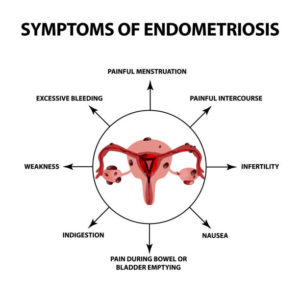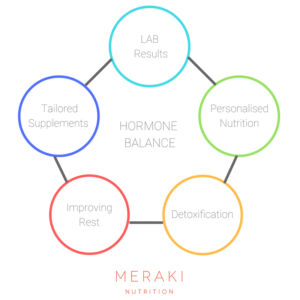Endo (inner)– metrio (uterus)– sis (inflammation)
Endometriosis can be a painful disorder in which tissue that normally lines the uterus – the endometrium – grows outside of the uterus. It is estimated that over 176 million women worldwide suffer from endometriosis symptoms and is one of the leading causes of infertility.
It’s believed that 40% – 60% of women who have very painful periods also have endometriosis and 20% – 30% of women who are unable to get pregnant are believed to have this condition.
Symptoms
Up to 50% of women are thought to have ‘silent’ endometriosis displaying with subtle symptoms or no symptoms at all, therefore, it’s important to be aware of all endometriosis symptoms.
- Painful periods
- Painful intercourse
- Increased pain during bowel movements
- Increased pain during urination
- Excessive bleeding
- Spotting and bleeding between cycles
- Painful digestion
- Constipation
- Nausea
- Chronic lower back pain
- Pelvic pain
- Infertility
- Joint pain
- Nerve Pain
- Chronic fatigue
- Bloating
The progression of endometriosis symptoms can be slow for many women. Diagnosis can be difficult as each woman experiences a different range of symptoms and pain.
Causes
The exact cause of endometriosis is not fully understood, possible explanations might include:
- Problems with menstrual flow; menstrual blood enters the fallopian tubes and pelvis instead of leaving the body in the usual way
- Surgery; Endometrial cells can move during a procedure such as hysterectomy or a c-section
- High estrogen; endometriosis is stimulated by the hormone estrogen
- Poor immune system; problems with the immune system can prevent the breakdown of problematic endometrial tissue
- Existing health conditions; some health conditions such as allergies, asthma, chemical sensitivities, autoimmune disease, chronic fatigue syndrome, and ovarian breast cancer have been linked to endometriosis.
- Genetics; a woman with a close family member who has endometriosis are more likely to develop endometriosis herself.
Anyone can develop endometriosis, but some factors that might increase risk include:
- Age: It is most common in women aged 30 to 40 years
- Never giving birth
- Genetics: One or more relatives having the condition
- Medical history: Having a pelvic infection, uterine abnormalities, or a condition that prevents expulsion of menstrual blood.
- Menstrual history: Periods lasting more than 7 days or menstrual cycles of less than 27 days.
- Caffeine, alcohol consumption, and lack of exercise: These can raise levels of estrogen.
How do GP’s diagnose endometriosis?
Diagnosis can be challenging because there is no single test for endometriosis. The only true way to diagnose endometriosis is through a surgical laparoscopy. This procedure is minimally invasive in which a thin tube with a miniature camera attached is inserted through a small incision in the pelvic area.
Other possible diagnosis methods include a pelvic exam, an ultrasound, MRI and the efficacy of use of birth control. It can take many years to receive a diagnosis.
What treatment is available?
There is currently no cure for endometriosis, but various treatments are used to relieve the symptoms.
Some medication options such as hormonal therapy (the pill or the coil) might be prescribed, however these can increase the risk of long-term infertility and cancer.
If endometriosis symptoms become too severe, surgical procedures may be necessary to remove areas of endometriosis or sometimes a hysterectomy maybe necessary.
Pain relief medications maybe prescribed to relieve inflammation and discomfort around menstruation.
Fertility treatment might be recommended via IVF.
How can a Nutritional Therapist Help?
Fortunately, there are natural approaches for endometriosis that can be utilised before turning to hormone treatments or invasive surgical procedures.
A Nutritional Therapist will focus on diet, balancing hormones, reducing inflammation to reduce pain, addressing nutrient deficiencies and supporting the liver and immune system.
Our Approach
- Normalise the immune response
- Optimise liver function to support hormone clearance and detoxification
- Support elimination of metabolic wastes
- Assist optimal digestion and transit time of food
- Support gut health and the microbiome
- Decrease exposure to hormone disruptors
- Reduce inflammation and oxidative stress
- Check the thyroid and adrenal function and support these if necessary
Functional Testing
Our recommended test is the FDX advanced blood analysis, which will provide a clear view of where you most need support. Dependent on your symptoms, we may recommend a stool test to accompany this.
If you or someone know is struggling with endometriosis, get in touch. You don’t need to suffer.


